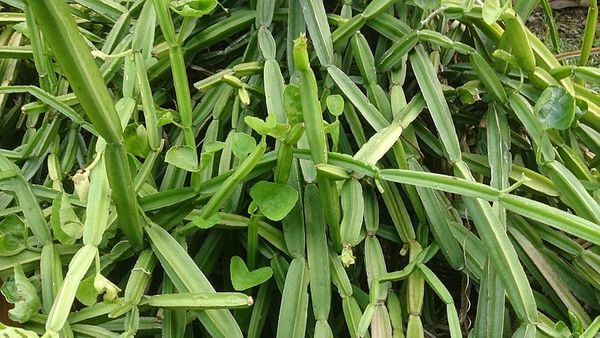What is Hadjod? Hadjod (Cissus Quadrangularis or Veld Grape) as the name suggests is an ancient herb that has been in use as a “Bonesetter” in India. Due to the presence of numerous antioxidants such phenols, tannins, carotenoids, and vitamin C, it is well known for its ability to heal fractures. According to Ayurveda, Hadjod juice’s Sandhaniya (supporting the union of shattered parts) property aids in the healing of bone fractures when consumed with cow’s ghee or a cup of milk.
It aids in weight management by enhancing the body’s metabolism. Additionally, one of the hadjod health benefits is the fact that it prevents the buildup of fats and lipids in the body and reduces triglyceride levels, both of which contribute to the management of obesity.
Hadjod’s astringent and wound-healing qualities aid in wound healing. Yes, there are many health benefits of hadjod.
Also Read: Health Benefits of Shallaki: Uses, Precautions & Side Effects
Nutrients in Hadjod Herb
The Nutritional Content Fount In Hadjod Root Powder/100 gm Is:
- Carbohydrates 68.89. ± 1.16 mg
- Proteins 7.5 ± 0.17 mg
- Fibres 5.97 ± 0.10 mg
- Potassium 67.5 mg
- Calcium 39.5 mg
- Zinc 3 mg
- Sodium 22.5 mg
- Iron 7.5 mg
- Lead 3.5 mg
- Cadmium 39.5 mg
- Copper 0.5 mg
- Magnesium 1.15 mg
Nutrients found in Hadjod (source)
Therapeutic and Medicinal Uses Of Hadjod aka Veld Grape
- Hadjod stem: It’s used to treat a range of illnesses. It is also one of the food supplements that is used the most frequently in southern India.
- Hadjod leaves: The young shoots of the plant are thought to be stomachic. Powder made from hadjod leaves is used to treat digestive issues.
- Hadjod juice: It is applied externally and given internally for the union of broken bones. Juice from one hadjod shoot, sprayed into the nostrils, helps with epistaxis (nose bleeding). It can also be applied as an eardrop for irregular menstruation and otorrhea.
- Powdered hadjod shoot ash: The powdered shoot ash is ingested to alleviate dyspepsia. (source 1) , (source 2)
Hadjod leads you to various health advantages like :
Hadjod Health Benefits: Used as a Pain Reducer
According to Hadjod mythology, it is used to treat pain. Its analgesic potential was examined using commonly utilised animal models all around the world. Hadjod has been demonstrated to have effects even at low dosages, proving its remarkable potency in imitating both central and peripheral pain. It is believed that the phytosterols -sitosterol and -sitosterol glycoside, terpenoids, and phenolic compounds contained in hadjod, including resveratrol, quercetin, quercitrin, and kaempferol, have analgesic qualities. (source)

Health Benefits of Hadjod In Healing Ulcers
Hadjod’s phytochemical constituents, such as polyphenols, glycosides, vitamin C, and beta-sitosterol, may have antiulcer potential or hasten ulcer healing by releasing polyamines and converting growth factors. (source)
Benefits Of Hadjod In Treatment Of Various Diseases:
According to traditional literature, hadjod is effective in treating a range of viral and bacterial infections. It was shown that the steroids and flavonoids in a hadjod stem extract had remarkable antiviral efficacy against herpes simplex virus types I and II. (source)
Benefits Of Hadjod In Treatment Of Inflammation:
Rats were utilised to investigate the anti-inflammatory effects of Hadjod using ear oedema. Hadjod can aid in the healing of fractures and treat allied illnesses brought on by fractures. It can also reduce swelling and relieve pain. Hadjod’s ability to reduce inflammation is due to the presence of beta-sitosterol and luteolin flavonoids. Hadjod blocks a variety of inflammatory mediators that promote vasodilation, increase vascular permeability, and generate oedema.
Hadjod’s Health Benefits for Obesity
Hadjod extract significantly increased high density lipoprotein cholesterol levels while lowering levels of total cholesterol, triglycerides, low-density lipoprotein cholesterol, and atherogenic index in rat hyperlipidemia models. It is believed that flavonoids such kaemferol, quercetin, and daidzein, as well as phytosterols like stigmasterol, -sitosterol, and ketosteroid, are responsible for hadjod’s antihyperlipidemic effects.
Warnings
It has been shown in numerous research to be nonexistent at regularly prescribed doses of hadjod extract. Hadjod extract has been associated with rare cases of lack of appetite, stumbling, dyspnea, and diarrhoea. (source)
Explore the health benefits of Indian Ayurvedic Herbs on Health Views Online – Explore health articles related to various health problems in men, women, kids, and senior citizens as well as Animals and Plants.
Featured Image Source: Mokkie, CC BY-SA 3.0 https://creativecommons.org/licenses/by-sa/3.0, via Wikimedia Commons.





